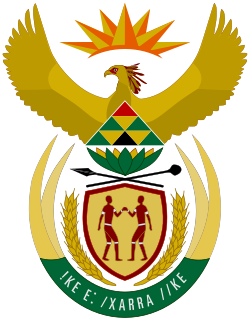| Constitution Eighteenth Amendment Act of 2023 | |
|---|---|
 | |
| Parliament of South Africa | |
| |
| Passed by | National Assembly |
| Passed | 2 May 2023 |
| Assented to | 19 July 2023 |
| Legislative history | |
| Bill title | Constitution Eighteenth Amendment Bill |
| Bill citation | B1—2023 |
| Introduced by | Ronald Lamola, Minister of Justice and Constitutional Development |
| Introduced | 11 January 2023 |
| Amends | |
| Constitution of the Republic of South Africa, 1996 | |
| Status: In force | |
The Eighteenth Amendment of the Constitution of South Africa (formally the Constitution Eighteenth Amendment Act of 2023) made South African Sign Language an official language of South Africa. [1]
Contents
The bill for the amendment was introduced in the National Assembly on 11 January 2023 by Ronald Lamola, the Minister of Justice and Constitutional Development. [2] It was adopted unanimously by the assembly on 2 May, [3] and signed by President Cyril Ramaphosa on 19 July of the same year. [1]
